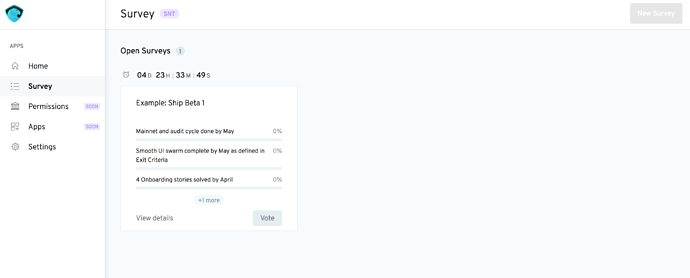At Status, we have been using Objectives and Key Results to define our roadmap. Now, we want to begin decentralising that process.
We created our first OKRs together, in person, in Bangkok. This time, we want to do it remotely, and using the most innovative governance tools available. The fun begins next week, starting on the 18th June 2018.
You can get involved in two ways:
- 18th to 23rd June: There is a template at the bottom of this post you can use to create your own O or KR (or both). Just comment on this thread or start your own one using the “OKR” category label. Please add (with motivation) what you think are the most important features that Status should work on in Q3.
- 26th to 30th June: Vote on the most important features using Status surveys in Aragon’s brand new app. Anyone who holds SNT can get involved in the voting. Just head here.
We’re excited to get the entire Status community involved in defining our roadmap. See below for more information on what OKRs are, how voting will work, and more. Huge thanks to the Aragon team and Brett Sun for helping us set this all up!
. . .
There are some very important things to note about the whole process in general:
- This is an experiment. It is about getting our community used to using tools on chain and figuring out whether strong signalling mechanisms that require at least some skin in the game and some willingness to pay gas fees will work going forward.
- All of this voting is happening on the main network, so any fees you need to pay to vote will be in real ETH.
- Status is not bound by the votes, we are using this as a means to poll the community in an interesting and novel fashion that requires a lot of participation.
- Voting in Aragon still requires a MetaMask account, so we need people to move some SNT to an accessible address before next week. Don’t move everything you own, just a few SNT should suffice to make sure that you can register your considered opinion, which is what we are really interested in getting insight into.
- SNT are not locked by voting - so you can use all the SNT in your wallet to vote on each and every survey you care about. Each vote just takes into account how many tokens you had at the block before the vote was created.
What are OKRs?
All Status core contributors are strongly encouraged to take part in the process as before. However, we’d like to offer the wider community the chance to submit their own Objectives or Key Results that they think we should be focussed on and justify why, using a short template we have created and our new research forum: https://discuss.status.im.
Here are some useful definitions, from this open deck:
OBJECTIVES
Are Ambitious, Uncomfortable, Qualitative.
For example, “Make Status the most active open source crypto project” or “Create the best DApp experiences for users and developers using Status” or “Make Status the world’s most secure decentralised messenger”.
KEY RESULTS
Are Quantitative and Measurable.
For example, “Increase monthly active contributors by 20%” or “Sponsor 3 Ethereum meetups around the world”.
The voting process
Aragon’s Survey App allows us to organise all the Objectives (qualitative stuff) with associated Key Results (quantitative stuff) and put them into separate surveys per Objective. Anyone who holds SNT in a MetaMask account 1 block before the survey in question began can then vote on the Key Results associated with each Objective.
To repeat: each Objective is created as its own survey. People can then vote on Key Results for the Objectives they care about and ignore the others. We use the specific results under each Objective to determine priority Key results from P0 to P5. Then, we look at the total number of votes for all Key Results under each Objective to identify and prioritise the most popular Objectives overall.
You can see a good example of how this will look in the “Ship Beta 1” survey already set up - which is an OKR we put together for Q1 2018.
This is the process in detail:
- Go to https://discuss.status.im, find the topic of the team under which you’d like to submit either an Objective, or some Key Results, or both.
- Each team has their own topic in the forum, clearly marked, so give a little thought as to which team your desires are most relevant to. If you don’t know, just post your submission in Core.
- Using the template provided in the first post, submit your thoughts, or simply comment on submissions by others with improvements or suggestions.
- Good submissions will become surveys using Aragon, where you can then use your SNT to vote for the most relevant Os and KRs associated with them.
- Make sure you have some small amount of SNT in a MetaMask account that also has a little bit of ETH to pay fees, before the 25th of June 2018.
- We take the feedback from all the submissions and votes and use it to refine our OKRs.
- We will then reflect on this process to improve future iterations of our own DAO and decentralised, open source development process.
OKR template
Please post the OKR in the following format. If you can’t fill everything out perfectly that’s fine, but the more details the better!
Objective: XXX
Key Result(s): XXX
Notes: XXX
Example
Objective: Improve utility of the wallet
Key Result(s): Support exchanging one token for another (e.g. ETH ↔ SNT)
Notes: Right now the wallet can’t do much with the existing tokens
